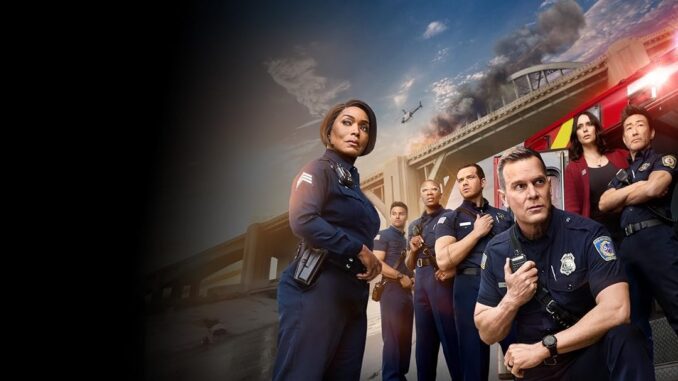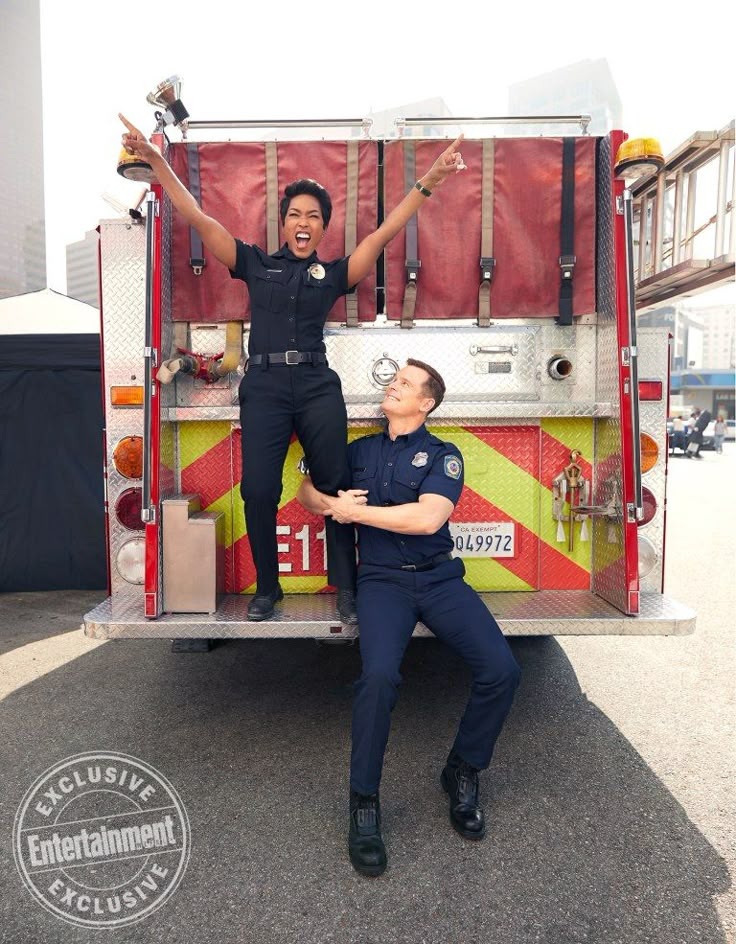
9-1-1: Nashville breaks a seven-year streak for the popular first-responder franchise. The second 9-1-1 spinoff, following the end of 9-1-1: Lone Star earlier this year, garnered a lot of attention for the question of where the new series would take place. The procedural drama, created by Ryan Murphy, Brad Falchuk, and Tim Minear, gets a lot of mileage out of its location by linking it to the type of emergencies that the main characters respond to.
But as casting and character details have started to emerge, there’s a bigger distinguishing factor than just the spinoff’s Nashville focus. 9-1-1: Nashville will debut on ABC later this year and, although an exact premiere date hasn’t been revealed just yet, executives have confirmed that Nashville and the main 9-1-1 series will crossover. That likely means, as the 118 attempt to move forward after the death of Captain Bobby Nash, they’ll rub shoulders with the spinoff’s new leads — NCIS: Los Angeles star Chris O’Donnell and Grey’s Anatomy alum Jessica Capshaw.
Welcome to a brand-new chapter in emergency television drama. Ryan Murphy, the mastermind behind emotional rollercoasters like 9-1-1 and 9-1-1: Lone Star, has just dropped a game-changer: 9-1-1: Nashville. And it’s not just another spinoff—it’s a complete rewrite of the playbook.
So, what makes 9-1-1: Nashville so different? Why is this particular installment in the franchise making waves across both the internet and TV screens? Let’s dive into it.
Breaking The Mold: Ryan Murphy’s Brave New Direction
For over 7 years, Murphy’s first-responder shows followed a solid formula: big cities, ensemble casts, and intense, cinematic rescues. 9-1-1: Nashville? Not so much.
The Nashville Factor: Why The City Matters
Music City USA isn’t just a pretty backdrop. It’s the heartbeat of the show. By choosing Nashville, Murphy introduces Southern grit, culture clashes, and country music flair that no other series in the franchise has dared to explore.
From L.A. Lights to Southern Nights
While 9-1-1 took us through the glamorous chaos of Los Angeles and Lone Star showed us Austin’s heat, Nashville brings a kind of soulful urgency. Emergencies here don’t just unfold—they sing.
Country Roads, Emergency Codes
Emergencies in Nashville come with their own flavor—think tornadoes at music festivals or barroom brawls gone wrong during open mic nights. The show’s vibe is raw, real, and oddly poetic.
Psychological Depth: Beyond the Sirens
Murphy’s latest creation leans harder into mental health, grief, and identity than previous series. Characters in Nashville feel more… broken, in the best way.
First Responders With First-Person Pain
Forget superhero-level stoicism. These characters bleed emotionally. They’re fighting fires at work and demons at home. And guess what? That makes them more relatable than ever.
Mirror Moments: Audiences See Themselves
Ever watched a show and thought, “Yep, that’s me”? That’s 9-1-1: Nashville. The writing invites introspection and offers emotional catharsis, scene after gripping scene.
A Cast That Hits All The Right Notes
Fresh faces, diverse perspectives, and raw chemistry—that’s the Nashville cast in a nutshell.
Not Just Star Power, But Star Quality
Rather than banking on A-listers, the show focuses on actors who can act—deeply, vulnerably, and with grit. That makes a difference.
Character Arcs That Actually Matter
Plot twists? Yes. But it’s the slow-burning arcs and character transformations that make Nashville feel so human. No one’s the same by the end of an episode.
Real Emergencies, Real Emotion
Yes, the action’s still there. But Murphy’s breaking away from the “shock value” formula to bring us emotion-driven emergencies.
Less Boom, More Breath
You still get your dramatic rescues. But this time, there’s space for the aftermath—the trauma, the reflection, the healing.
Trauma As A Theme, Not A Plot Device
The emergencies aren’t random. They’re thematically tied to the characters’ internal struggles. That’s rare, and it hits hard.
Ratings Are Nice, But Engagement Is Better
Sure, 9-1-1: Nashville is racking up numbers. But what’s more impressive? Online buzz and audience investment.
Social Media’s New Darling
Twitter, TikTok, Reddit—fans are dissecting every episode. And when people are posting theories and memes, you know you’ve struck gold.
From Viewers to Superfans
This show isn’t just being watched—it’s being felt. People are relating, reacting, and rooting hard for these characters.
SEO Goldmine: Keywords That Drive Traffic
Murphy’s team isn’t just killing it on TV—they’re dominating Google too. Terms like:
-
“9-1-1 Nashville cast”
-
“Is 9-1-1 Nashville a spinoff?”
-
“Ryan Murphy’s new series”
-
“Where to watch 9-1-1 Nashville”
…are trending weekly.
A Franchise Reimagined, Not Recycled
Where Lone Star felt like a copy-paste (with cowboy boots), Nashville feels like a genuine evolution.
The 7-Year Shift—Finally
For the first time in 7 years, Murphy’s not playing it safe. He’s rewriting his own rulebook, and it shows.
A New Blueprint For Spin-Offs
9-1-1: Nashville proves that spin-offs don’t have to be secondhand stories. They can be revolutionary, refreshing, and original.

What’s Next for the Franchise?
If Nashville is the new gold standard, we can expect future series to follow its emotionally raw, character-driven blueprint.
International Possibilities?
Could a 9-1-1: London or Tokyo be on the horizon? Now that the mold is broken, anything’s possible.
Final Thoughts: Why This One’s Different
9-1-1: Nashville doesn’t just break a 7-year trend—it obliterates it. It’s more than a spin-off. It’s a statement.
And that statement is loud and clear: Ryan Murphy isn’t done surprising us.
Conclusion: A Risk That Paid Off Big Time
By embracing emotional depth, a new cultural setting, and storytelling rooted in realism, 9-1-1: Nashville has redefined what a first-responder drama can be. It’s a heartfelt detour from the high-octane formula, and it works—beautifully. Whether you’re a longtime fan or a curious newcomer, this show deserves a spot on your watchlist.